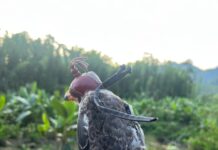Sri Vijaya Puram: A fresh round of skill development training has been announced for island residents, targeting those looking to pursue self-employment across sectors like handicrafts, food entrepreneurship, and livestock-based livelihoods. The initiative, jointly organised by the A&N Islands Khadi & Village Industries Board (KVIB) and the Directorate of Industries, aims to equip locals, particularly youth, with vocational skills that align with local resources and market demands.
Five specific training programmes have been rolled out, including a 15-day course in manufacturing coconut shell handicrafts, a second course of equal duration focused on creating products from pandanus leaves, coir, and other natural fibres, a two-week fast food stall entrepreneurship module, a one-month beautician course, and a one-month training programme in poultry or dairy farming.
The trainings will be held at certified centres under the KVIB’s purview, following modern syllabi that combine theory with practical exposure. Organisers say the curriculum has been designed to ensure that candidates emerge as “all-round performers” in their respective trades, with enough hands-on experience to take their skills directly to the market.
This initiative forms part of the broader push for economic decentralisation and grassroots entrepreneurship across the Andaman and Nicobar Islands. With limited formal employment opportunities in remote and rural pockets of the territory, skill-building is being positioned as a tool for both economic inclusion and social resilience. The board is particularly targeting youth between 18 and 45 years with a minimum educational qualification of Class VIII.
Aspiring trainees are invited to collect and submit application forms before July 31. Forms are available online at andaman.gov.in/Ann_all and can also be submitted physically at the KVIB’s office in Udyog Parisar, Middle Point, Sri Vijaya Puram. For residents outside South Andaman, extension offices of the Industries Department in respective zones are accepting applications.
Officials say the demand for such skill-based training has been growing, especially after the pandemic, which saw many returnees to the islands seeking localised income opportunities. The emphasis on trades like coconut handicrafts and coir-based items leverages the islands’ abundant natural materials, while the inclusion of fast food entrepreneurship and beautician services reflects evolving consumer needs within the urbanising pockets of the archipelago.
Notably, the programme is being implemented without charge, allowing economically vulnerable candidates to gain access to otherwise costly training. Authorities are also exploring ways to support graduates through post-training assistance, such as micro-loans, toolkits, or connections to local markets and cooperative platforms.
Training in poultry and dairy farming, which spans a month, is expected to draw interest from semi-rural families who already possess some land or livestock. With increasing demand for local eggs, milk, and poultry products, the programme aims to strengthen household-level food security while offering scalable income potential.
KVIB officials have urged interested candidates to act quickly due to limited batch sizes. The board is also working with the Industries Department to monitor employment outcomes of past training participants, and early indicators suggest that a significant proportion have either launched small ventures or found freelance work using their acquired skills.
The skill development programme comes at a time when the islands are also witnessing a renewed focus on self-reliance and decentralised production models, especially in crafts and food-based micro-industries. Authorities hope that, if successful, this training round will become a recurring feature, fostering a skilled, self-employed workforce that complements the islands’ development goals.
For many young residents of the islands, the programme represents a starting point, not just toward earning a livelihood, but toward building an identity rooted in entrepreneurship, creativity, and local relevance.





